The Reforms of Kings Asa, Jehoshaphat, Hezekiah, and Josiah 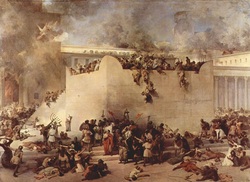 Francesco Hayez, Destruction of the Temple Entropy was one consequence of the fall, dooming all creation to a slow decay into chaos. Even the loyalty and gratitude of the people the Lord called out of the fray and into his kingdom are not exempt from the effects of entropy. This decay is seen as their faith drifts from God's core tenants through worldly desires of control, convenience, and compromise. To reverse the drift, The Lord periodically raises up radicals who call for reform, to end unorthodox practices and return to a pure relationship of faith. This inevitable cycle is a consistent theme within the history of the church, with clear biblical foundations as seen throughout the Kings of Judah. During the divided monarchy of Israel, the drift that began gradually during the golden age of King Solomon jumped drastically with the northern kingdom of Israel's political split sanctioning blatant compromise in the name of convenience to retain control of the people. While the southern kingdom of Judah retained the core faith, it suffered severe entropy during the reigns of twelve apostate kings influenced by surrounding nations. Of all twenty kings of Judah, eight are remembered for their obedience to God, and of these only four enacted reforms. Through the four reigns of kings Asa, Jehoshaphat, Hezekiah, and Josiah, we can learn what influenced their actions, how they initiated reforms, and what foolish errors they made to interpret the effectiveness of their efforts. By studying their lives we can avoid repeating their mistakes in the cyclical battle against entropy while we fulfill the great commission today. King Asa - 1 Kings 15 | 2 Chronicles 14-16 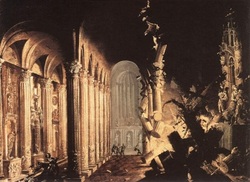 Francois de Nomé King Asa Destroying the Idols King Asa's reign sets several trends, reoccurring motifs and unique phrases appearing in the text since he is the first king remembered for doing “what was right in the eyes of the Lord, as his father (ancestor) David had done.” With king Asa two markers of spiritually successful kings appear: the removal of the high places constructed by Rehoboam at Dan and Bethel (2 Chron. 15:17), and whether the king's heart was committed to God all his life (1 Kings 15:14). Influences. Asa's reign also introduces the role the faithful influencer God uses to instigate official reforms. This often inconspicuous theme introduces turning points in the reigns of kings to see if they will follow the words of the faithful. The text reveals the specific in point Asa's reign when the reforms summarized in Asa's introduction were actually carried out. The king was encouraged to instigate his reform after the Spirit of God filled Azariah and prophesied that The Lord will return to the kingdom if the kingdom returns to The Lord (2 Chron. 15:1-7). Reforms. Like the future reformers, Asa inherited a kingdom spoiled by creeping syncretism since their fathers included the detestable practices of the nations the Lord had driven out, stirring up His jealous anger (1 Kings 14:22-24).As a result, Asa's reforms sets a trend of first repenting and removing the idolatrous practices of their fathers, and then rededicating the people to The Lord. He removed the idols, high places, and incense altars throughout Judah, Benjamin and captured towns of Ephraim (2 Chron 15:8b) by smashing their sacred stones and cutting down their Asherah poles. He even washed away the remnants of his grandfather's sins by expelling male shrine prostitutes from the land and tossing all the idols his fathers had made. He even deposed his own grandmother, Maacah the Queen Mother, after cutting down and burning the Asherah pole she had made (1 Kings 15:12). Here Asa set another trend by dumping the burned and broken idols in the Kidron Valley east of Jerusalem. Asa's reforms continued by rededicating the nation to The Lord. He repaired the temple (2 Chron. 5:18) and gathered the nation's people, including large numbers from Israel who immigrated after hearing that the Lord was with Judah (v.9). King Asa commanded the people to seek the Lord the God of their fathers and to obey his law and his commands. He offered sacrifices to the Lord and entered into a covenant to seek him with all their hearts & souls. In an extreme move, anyone would not seek The Lord was to be put to death (v. 10-15). He finished by bringing the dedicated articles into the temple of God (v18). Foolishness. Sadly foolishness also appears within each good king's reign. Asa did not trust in God and plundered the temple to buy an ally against Israel. When Hananni the seer confronted Asa for relying on the king of Aram and not on the Lord, he imprisoned the seer out of rage and brutally oppressed some of the people (2 Chron 16:7-10). As a result of this, King Asa is not depicted as finishing well by Chronicles, even refusing to seek help from the Lord in his old age when his feet became severely diseased, trusting only the physicians (v.12). King Jehoshaphat – 1 Kings 22:41-50 | 2 Chronicles 17-21 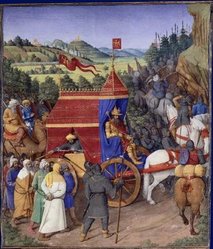 Jean Fouquet, Triumphe de Jehoshaphat Jehoshaphat's reign is remembered as literally following in the footsteps of his father Asa, also “doing what was right in the eyes of the Lord” (1 Kings 22:43). Like his father, the Chronicler points out that the high places were not removed and remained a snare for the people, but his heart was devoted to the ways of the Lord (2 Chron. 20:33). Influences. While many prophets and seers deliver words during Jehoshaphat's reign, the influencer that sparked Jehoshaphat's reforms is alluded to be his father Asa. The Lord is said to have been with Jehoshaphat because “in his early years he walked in the ways of his father,” not consulting foreign gods, but following The Lord's commands (2Chron 17:3-4). Jehoshaphat's faithfulness should serve as an illustration of the fruits produced by good parenting. Reforms. The record of Jehoshaphat's reforms is the shortest, probably because his father had finished the bulk of the land's purging and Jehoshaphat was merely mopping up. He finished his father’s goal in ridding the land of remaining male shrine prostitutes (1 Kings 22:46) and he removed remaining high places & Asherah poles from across Judah. (2 Chron 17:6). Since rededicating the nation to The Lord would have been unnecessary, the main thrust of Jehoshaphat's reforms aimed at building on the people's existing faithfulness with biblical instruction. The king appointed five teachers, accompanied by nine Levites and two priests to travel throughout Judah with the Book of the Law teaching the people (2 Chron 17:7-9). The following verses seem to imply that as the people began to understand their faith, the fear of Lord fell on all the surrounding nations, many of which brought gifts to Jehoshaphat. A case study of the need for teaching bible. Later, Jehoshaphat initiated a Mosaic-style judicial system to support the civil components of the law by appointing judges to settle disputes in the land (2 Chron. 19:4-11). Each judge being reminded that they judged not for king, but for The Lord. Foolishness. Jehoshaphat's reign was faultless as long as he stayed in lock-step with The Lord, including his military victories over Moab and Ammon because he inquired of God (2 Chron. 20:1-29). However, the foolishness of Jehoshaphat's repeated attempts to build an alliance with Israel nearly outweighs his positive contributions to Judah. He let Israel's king Ahab talk him into joining forces against Ramoth Gilead after a prophet of The Lord condemned the mission. Though he survived the encounter, the seer Jehu announced that The Lord's wrath now laid upon him for trying to help the wicked and loving those who hate The Lord (2 Chron. 19:1-3). Despite this pronouncement, Jehoshaphat still pursued a relationship with Israel, building a fleet of trading ships with Ahab's son and successor. Again, a prophet (Eliezer) condemned the project because Jehoshaphat made an alliance with Ahaziah, and the Lord destroyed the ships before they ever set sail (2 Chron. 20:35-37). The worst of Jehoshaphat's foolish attempts at alliance was marrying his succeeding son to Ahab's daughter, which spawned the future queen mother Athaliah who assassinated all of his offspring save Joash. Yet, Jehoshaphat is still considered to have finished well (ex. 2 Chronicles 20), though his reign reveals the dark side of pursuing unity to the point of compromise. King Hezekiah - 2 Kings 18-20 | 2 Chronicles 29-32 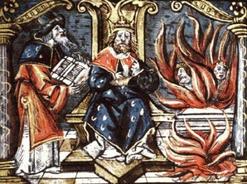 Henry VIII´s Great Bible woodcut, burning idols Over nine kings and 169 years passed before the next king who brought about meaningful reforms reigned in Judah. King Hezekiah is clearly considered the hero of Judah by the Chronicler. In addition to the standard approval of doing what was right in the eyes of the Lord, Hezekiah removed the high places of both Judah and Israel, now that the northern kingdom's power was waning. The book of Kings also highly lauded Hezekiah's faithfulness, declaring that “there was no king like him among all the kings of Judah, either before him or after him,” being successful in whatever he undertook because the The Lord was with him (2 Kings 18:5-7). Influences. Unlike the other great reformer kings, the bible is silent on who initially influenced Hezekiah. It's possible that Hezekiah was influenced by the prophet Oded who convinced Israel that their attack on Judah was divine retribution against Hezekiah's evil father Ahaz; a conflict which left two of his succeeding brothers dead (2 Chron. 28:7-14). Isaiah was clearly an influence later in Hezekiah's life (Isaiah 37 & 39), but its unknown how early his influence begain. While unnamed, Hezekiah's influencer clearly left an impression, since Hezekiah wastes no time beginning his initial reform in the first month of the first year of his reign (2 Chron. 29:3). Reforms. Hezekiah reversed the typical reform methodology of purge and rededicate. One of his first acts as king, if not the first, was to reopen the temple which his father Ahaz had stripped and shuttered. Hezekiah had the priests consecrate themselves and then consecrate the temple, which had been so abused that it took 16 days to purify it (2 Chron. 29:3-17). As soon as the temple was prepared, Hezekiah gathered the city officials, the Levite musicians, and the people of Judah to offer sin offerings to the Lord atoning for their nation's sins. These were followed by burnt offerings and thank offerings to rededicate themselves to the Lord. (v.20-24). He then led the nation in worship in the newly reestablished services of the Lord, and so many people offered sacrifices there weren't enough priests (v34). King Hezekiah then announced plans to celebrate the Passover, which had not been performed according to what was written (2 Chron. 30:5). Without compromising with Israel as Jehoshaphat had, Hezekiah reached out to the north and invited them to participate in worshiping the Lord (v.6). Though the messengers were scorned from town to town, people came from as far as Asher, Manasseh and Zebulun (v10) (not everyone who came was ceremonially clean, but Hezekiah prayed for their inclusion and God healed them (v18-20)). By the hand of God, unity was achieved between the people of northern and southern kingdom to celebrate the Passover according to the word of God for seven days (v21), and then (by popular demand) seven more (v23)! The Passover was so awe-inspiring, it started what might be described as a “holy riot.” The people threw the incense altars of Jerusalem into the Kidron Valley (v14) and the Israelites went out to the towns of Judah and smashed the sacred stones, cut down the Asherah poles and destroyed the high places throughout Judah, Benjamin, Ephraim and Manasseh (2 Chron 31:1). The bronze serpent used by Moses in the desert may have been destroyed in the wake of this event (2 Kings 18:4). Once the people had truly experienced the presence of the Lord, they responded to Hezekiah's call to support the temple financially (2 Chron. 31). They gave in “heaps,” returning ministry to biblical requirements (v.8). Context shows that Hezekiah performed the Passover sometime after the 6th year of his reign after Israel's first deportation (2 Kings 18:10-11), but before his 14th year when Assyria besieged Judah, as evidenced by Sennacherib's remarks on the destruction of the high places and altars (2 Chron. 32:12). With the power of the Northern Kingdom decimated, northern participation would not be obstructed and the high places could be removed (unlike Asa and Jehoshaphat's reigns). This Passover would have taught the people to trust Hezekiah while he prepared Jerusalem for a siege and to listen when he encouraged them that with God there is a “greater power with us than with them” (2Chron 32:7-8). Ultimately the people were faithful and didn't listen to Assyria's scornful messengers (v9-19). Foolishness. Hezekiah's success through the Lord opened him to pride (2 Chron 30:25). Following his divinely healed sickness (which was probably brought on by the stress of resisting Assyria), Hezekiah paraded everything in all his entire kingdom before envoys from Babylon. God had left him to test what was in his heart (2 Chron 30:31) and Hezekiah's failure perpetuated God's wrath against Judah. During this time he succumbed to the will of Assyria, stripping the temple to pay them off (2 Kings 18:14-16). We should learn that even one as highly regarded as Hezekiah was still susceptible to pride, but we should also take comfort in the fact that even one who sought God as wholeheartedly as Hezekiah did still struggled with faithfulness. King Josiah – 2 Kings 22-23:30 | 2 Chronicles 34-36:1 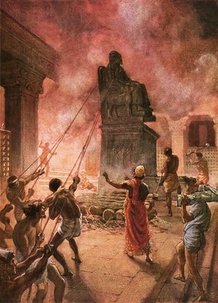 William Hole, Josiah Cleansing the Land Only two generations pass before Josiah becomes king of Judah, but his grandfather Manasseh led the people to do more evil than the preceding nations the Lord had the Israelites destroy (2 Chron. 33:19). Even Josiah who was recounted as the most faithful king Judah had ever seen, turning to God with all his heart and with all his soul and with all his strength (2 Kings 23:25), could only delay the inevitable destruction of Judah (brought on by Manasseh (Jeremiah 15)) through his radical reforms which rededicated the people and removed the Israelite high places at Dan and Bethel as prophesied. Influences. Josiah is clearly influenced by Shaphan the secretary and Hilkiah the high priest who delivered the lost Book of the Law to Josiah, and especially the prophetess Huldah who revealed God's pending wrath to instigate the most radical reforms in the history of Judah (2 Kings 22:10-14). However, these only account for Josiah's second reform in the eighteenth year of his reign. Crowned at age eight, seeking The Lord at age sixteen and purging idols from Judah at age twenty seem almost insurmountable for one so young without guidance. Scripture does not indicate a direct cause of Josiah's faith, but it's possible that Josiah may have been old enough to learn to fear The Lord via his grandfather Manasseh's repentance (2 Chron. 33:12). Reforms. Josiah's first reform is only mentioned in Chronicles, where he either finished purging high places, Asherah poles, carved idols, and cast images started by the humbled Manasseh, or he erased the idols his short-lived father Amon may have reinstated (2 Chron. 34:7). It is difficult to assign specific deeds to either the first or second reform since Chronicle's places more events before the Book of the Law is found, while Kings places them afterward. Regardless of the timing, Josiah went beyond any previous reformer in removing false worship from all of Israel. Like the previous kings, Josiah cut, tore, crushed, smashed, and burned everything used for worshiping anything other than The Lord, except he even treated the ashes of those items as unholy. He scattered the unholy dust over the graves of the common people, or defiled high places like Bethel with them when human bones weren't available. Josiah's fiery tirade reads like an exhaustive hit list of idolatrous sites in need of expulsion (2 Kings 23:4-25). The rebuilt high places of Israel bore the brunt of his wrath, fulfilling the prophets words against Rehoboam nearly two centuries prior (v.16-18). There he removed and defiled all the shrines at the high places in the towns of Samaria, even slaughtering all their priests on the altars and burning human bones on them (v.20). In following with previous reformers, Josiah filled the void created by the destroyed idols with true orthodox worship of The Lord as written in the Book of the Law. He renewed the covenant, reading all the words of the Book of the Covenant in their hearing of all the people from the least to the greatest (2 Kings 23:1-3). By bringing all the people back into the presence of God and the historical roots of their faith, they pledged themselves to the covenant. Josiah then ordered the celebration of the Passover as written in the Book of the Law, which is described as exceeding even Hezekiah's momentous Passover (2 Chron. 35:18). Not since the days of the judges who led Israel, nor throughout the day of the kings of Israel and the kings of Judah, had any such Passover been observed. Foolishness. Josiah's triumphant reign turned suddenly tragic when he went out to face Pharaoh Neco. Even though Josiah was warned not to interfere, he foolishly went out to battle disguised in a scene reminiscent of the fall of Israel's king Ahab. While Josiah's political motives do not seem entirely clear, God's motives to punish Judah were since he had promised not to destroy the nation during Josiah's lifetime. Josiah's heart for The Lord was so pure, that even the famous prophet Jeremiah lamented his death (2 Chronicles 35:25). Conclusion 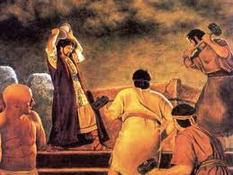 Even when God's Kingdom was physically manifested on earth within the nation of Israel, the chosen people of God needed radical leaders to boldly step out and return them to a proper relationship with The Lord. For this reason the biblical record lauds the four kings, Asa, Jehoshaphat, Hezekiah, and Josiah as heroes of the faith. For despite their own personal foolish sins and failings, they listened to God's prompting through influencers and instituted reforms that purged the land of syncretistic and idolatrous worship before rededicating the people of the nation to faithfully follow the Book of the Law's decrees. With Jesus Christ's re-inauguration of the Kingdom, radical reformers are still needed today to reestablish right relationships with God. However, the kingdom is no longer tied to an earthly nation within which the temple of The Lord resides. Therefore, the literal burning or destruction of non-Christian works or worship centers is unwarranted, for our battle is no longer against earthly things, but the spiritual forces of evil (Eph. 6:10). Instead, the chosen people are described as God's temple within an incorporeal Kingdom (1 Cor. 3:10-17). The idols and Asherah poles in each individual's life must be removed and the high places of our day, whether the university which promotes atheism or the media which promotes pluralism, must be removed or retaken to prepare and purify the people's hearts for the love of Jesus Christ (1 Cor. 6:12-20). As the church carries out the Great Commission, she must follow the example of Josiah and Hezekiah by bringing believers and inviting seekers back to the Passover. In celebration, she must lead the people in remembering God's deliverance through the shedding of blood. Except, now Jesus is our Passover lamb, and it is trusting in Christ's shed blood on the cross that brings deliverance. This is how God led reforms begin. Thus, it is necessary to recognize when our words and deeds have drifted from the biblical vision of the gospel through control, convenience, and compromise. Since entropy of the faith is inevitable, it can be planned for. The church must be vigilant in identifying and uprooting syncretism created by the world, ever returning to the good news of the gospel. She must constantly be making new disciples of all nations to live in the world, but not of it; disciples ready to call the church back to her roots through reform.
1 Comment
Shauna
7/20/2011 07:42:33 am
Enjoyed this topic and the pictures.
Reply
Leave a Reply. |
AuthorBrett Yardley: Categories
All
Archives
January 2019
|

